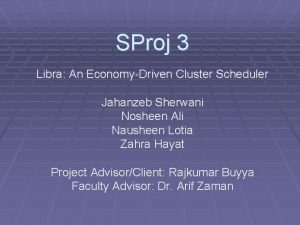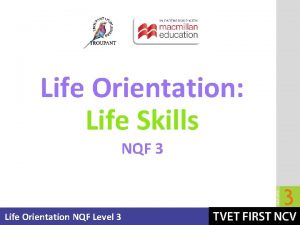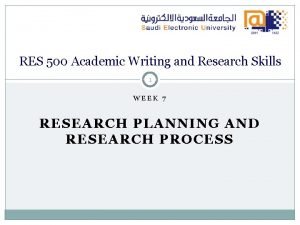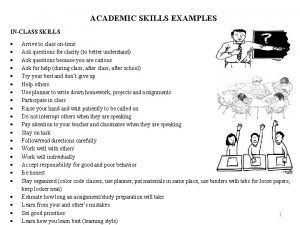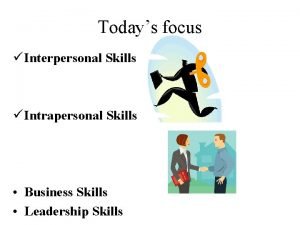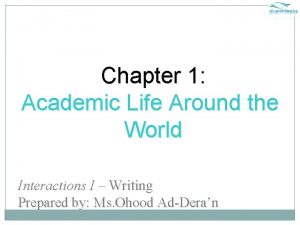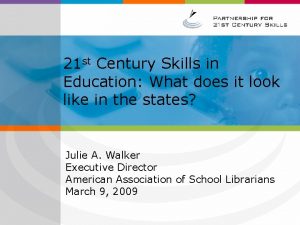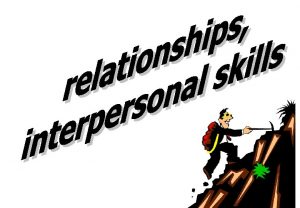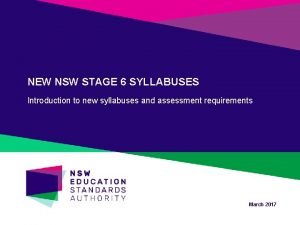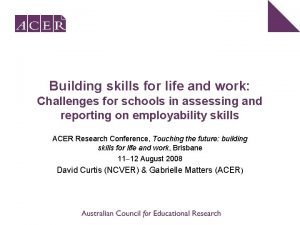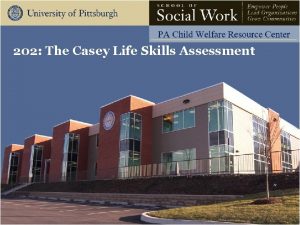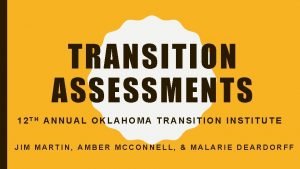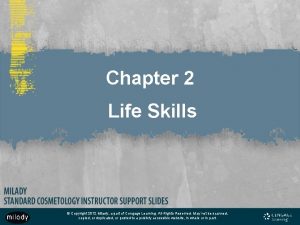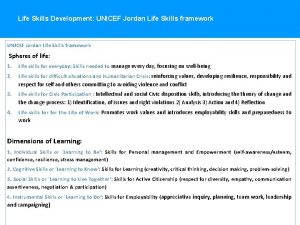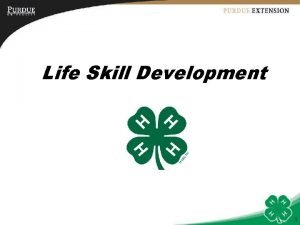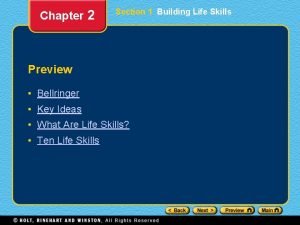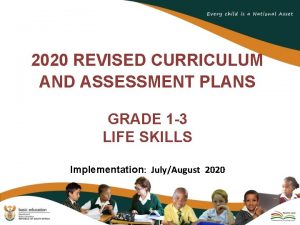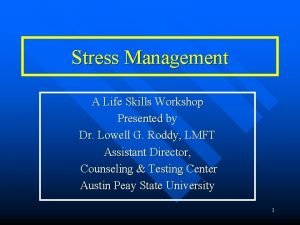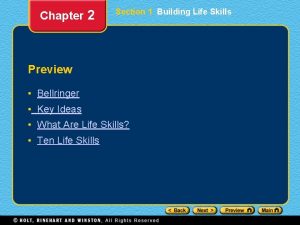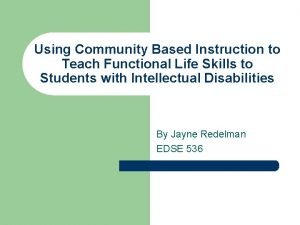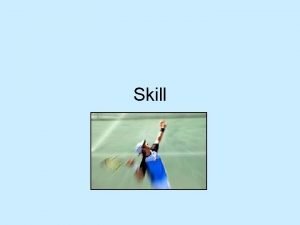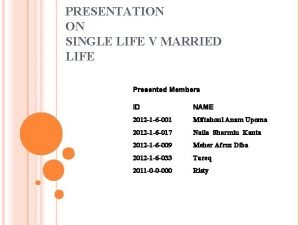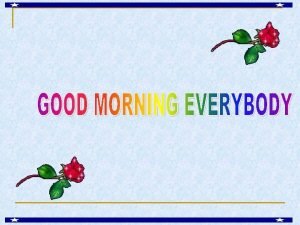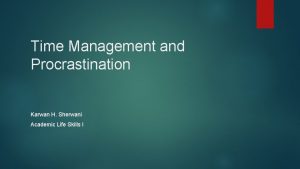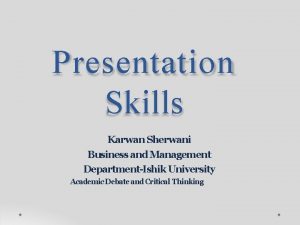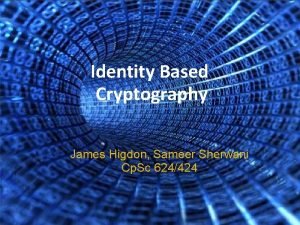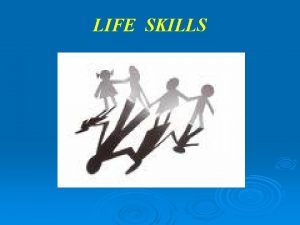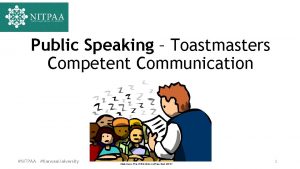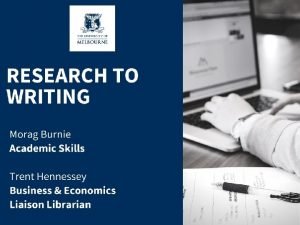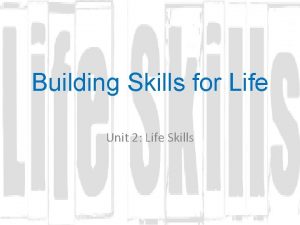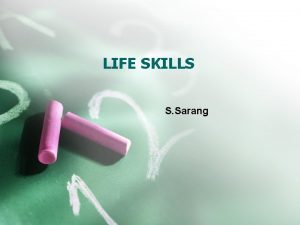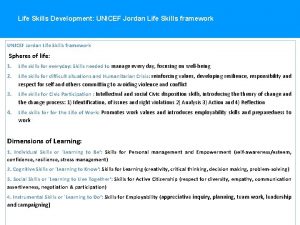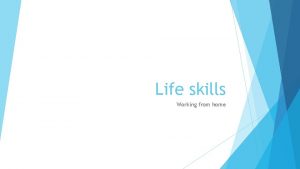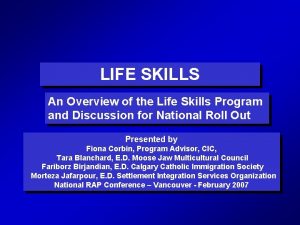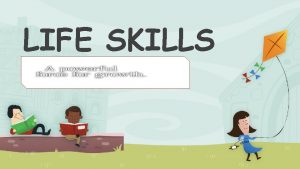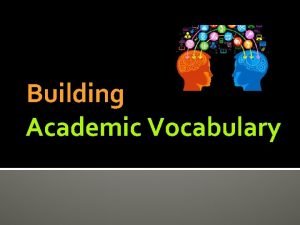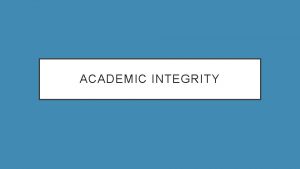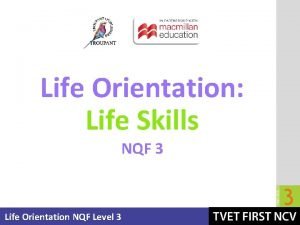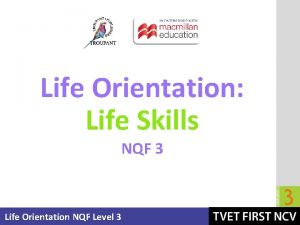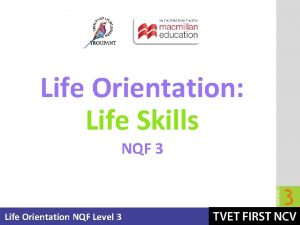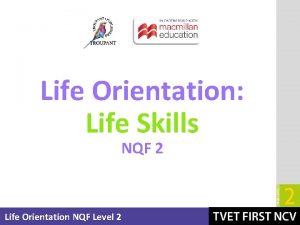Academic life and Skills I Karwan H Sherwani



































- Slides: 35

Academic life and Skills I Karwan H. Sherwani

A critical analysis of the freshman experience There is no real excellence in all this world which can be separated from right living. The 7 Habits of Highly Effective People provides a holistic, integrated approach towards personal and interpersonal effectiveness. Habits are patterns of behavior that involve three overlapping components: knowledge, desire, and skill.

The Power of a Paradigm is a word which means "a pattern or model; the generally accepted perspective. A paradigm is the mental maps that we use to describe the world around us. They are the lens that each of us uses to understand everyone and everything. The key of a paradigm isn't as much in the true nature of a thing as much as our perception of the thing. The way we perceive, understand & accordingly interpret and judge things.

Paradigm Shift A paradigm shift is the change in one's perspective concerning the way we perceive things. They are two different things: changing the way we see things around us and changing the things around us. Covey describes how once he was frustrated in the subway to see the very bad behavior of a man's children. A "paradigm shift" occurs when our paradigms change, allowing us to see the world in a new light. Sometimes this happens suddenly, and sometimes very gradually.

Do you see an old woman or a young woman?

If you look at the picture one way, you see an old woman. If you look another way, you see a young woman. How you interpret the picture depends upon your paradigm. And you paradigm determines what are going to say about the picture. Our behavior is the result of the way we see the world. Listen to others and be open to their perception, to get a far more objective view. Two people can see the same thing, disagree and yet both be right.

"Habits" we will define a habit as the intersection of knowledge, skill, and desire. Knowledge is theoretical paradigm, the what to do and the why. Skill is the how to do. And desire is the motivation, the want to do. In order to make something a habit in our lives, we have to have all three. By working on knowledge, skill, and desire, we can break through to new levels of personal and interpersonal effectiveness as we break with old paradigms that may have been a source of our habits.

Can we create a HABIT? Habits are learned and unlearned Habits are powerful factors in our lives. Because they are consistent, often unconscious patterns, they constantly, daily, express our character and produce our effectiveness or ineffectiveness.


Principles of Growth and Change The principle of growth and change refers that there is some quick and easy way to achieve quality of life -- personal effectiveness and rich, deep relationships with other people -- without going through the natural process of work and growth that makes it possible. There are sequential stages of growth and development. For instance, a child learns to turn over, to sit up, to crawl, and then to walk and run. Each step is important and each one takes time. No step can be skipped. People know and accept this fact or principle of process in the area of physical things, but to understand it in emotional areas, in human relations, and even in the area of personal character is less common and more difficult.

Maturity Range Independence

P/PC Balance “The fable of the goose and golden eggs” The social Mirror and Social Maps 1 - Genetic determinism, DNA, grandparents. 2 - Psyhic determinisim, Parents, childhood experience. 3 - Environmental determinism, boss, your spouse, economic situation Stimulus and Response

The Way We See the Problem is the Problem People are intrigued when they see good things happening in the lives of individuals, families, and organizations that are based on solid principles. They admire such personal strength and maturity, such family unity and teamwork, such adaptive synergistic organizational culture. And their immediate request is very revealing of their basic paradigm. "How do you do it? Teach me the techniques. “ What they're really saying is, "Give me some quick fix advice or solution that will relieve the pain in my own situation. “ The more people are into quick fix and focus on the acute problems and pain, the more that very approach contributes to the underlying chronic condition.

Listening to Our Language

Circle of Concern/ Circle of Influence

Circle of Concern/ Circle of Influence § The excellent way to become more self-aware regarding our own degree of proactivity is to look at where we focus our time and energy. § We each have a wide range of concerns- our health, our children, problems at work, the national debt, nuclear war. § We could separate those from things in which we have no particular mental or emotional involvement by creating a “Circle of Concern. ” § By determining which of these two circles is the focus of most of our time and energy , we can discover much about the degree of our proactivity.

Ø Proactive people focus their efforts in the circle of influence they wok on the things they can do something about.

Ø Reactive people, on other hand, focus their efforts in the circle of concern. Ø They focus on the weakness of other people, the problems in the environment, and circumstances over which they have no control. Their focus results in blaming and accusing attitudes, reactive language, and increase feelings of victimization.

The Story of Organizations and Execution Stephen worked with one organization for several years that was headed by a very dynamic person. He was creative, talented, capable and brilliant and everyone knows it. But he had a very dictatorial style of management. The net affect was that he alienated almost the entire executive team surrounding him. Once the executive team gather in the corridors and complain to each other about this manger. One of the executives was proactive, instead of criticizing them, he would compensate for them. Where the president was weak in his style, he’d try to buffer his own people and make such weaknesses irrelevant. This man focused on his circle of influence.

The Story of Organizations and what expected. He anticipated the president’s need and when Execution he presented information, he also gave his analysis and This man treated like a gofer, also. But he would do more than recommendations. From that time, the president took this man’s analysis and recommendations into consideration. instead of saying “go for this” and “go for that” but to this man it was “ What’s your opinion? ” So his circle of influence had grown. This caused quite a stir in the organization.

“This man’s success wasn’t dependent on his circumstances. many others were in the same situation. It was his chosen response to those circumstances, his focus on his Circle of Influence, that made this difference. ”

Stimulus - Response Stimulus (a change in a situation or environment ) – Response (How we choose to respond to the Stimulus) When we face a situation, they way we response can be as the following: 1 - blame the situation, environment, and other people. (Reactive) 2 - Take initiatives to be responsible (Response-able), to choose your response. (Proactive)

Proactive – Reactive Response to Stimulus Reactive people are affected by v Physical Environment, (If weather is good, they feel good, if it isn’t, if affects their attitude and responses to stimulus). v Social Environment, (if people treat them well, they feel well, when people don’t, they change their responses) v Reactive people build their emotional live around the behavior of others. Proactive people are also affected by physical and social environment, but their response to stimulus is a value based response. Values ex. (Honesty, thoughtful, generosity, and interdependence).

“Not being responsible“ - (Not able to choose my response)- A short Story One time a student asked me, "Will you excuse me from class? I have to go on a tennis trip. " "You have to go, or you choose to go? " I asked. "I really have to, " he exclaimed. "What will happen if you don't? " "Why, they'll kick me off the team. " "How would you like that consequence? " "I wouldn't. " "In other words, you choose to go because you want the consequence of staying on the team. What will happen if you miss my class? " "I don't know. "

A short Story (Continues) "Think hard. What do you think would be the natural consequence of not coming to class? " "You wouldn't kick me out, would you? " "That would be a social consequence. That would be artificial. If you don't participate on the tennis team, you don't play. That's natural. But if you don't come to class, what would be the natural consequence? " "I guess I'll miss the learning. " "That's right. So you have to weigh that consequence against the other consequence and make a choice. I know if it were me, I'd choose to go on the tennis trip. But never say you have to do anything. " "I choose to go on the tennis trip, " he meekly replied. "And miss my class? " I replied in mock disbelief.

“Taking Initiatives” It means recognizing our responsibility to make things happen. Many people fail to take responsibility, and they wait for something to happen or someone to take of them. “How do I study Management? No one wants to help me”, “ I don’t know how to make a good presentation”. But, initiators are solutions to the problems, not problems themselves. They take initiative to do whatever is necessary to get their jobs done. Act, or be acted upon.

The other end of the stick (Response – Consequences - Mistake) While we are free to choose our actions, but we are not free to choose the consequences. “When we pick up one of the end of the stick (Response), we pick up the other end (Consequences)). Undoubtedly, there have been times when we have picked up a wrong response, which brought wrong consequences, there are called mistakes. We can’t undo them. What is important is to admit, correct, and learn from it. This will turn a failure to a success.

End of Proactive habit! Don’t judge Choose your response, be (Response-able). Be a part of the solution not part of the problem. Don’t argue for other people’s weakness. Don’t blame and criticize the environment and people. When you make a mistake, admit it, correct it, and learn from it.

Habit 2 – Begin with the end in the mind What it means to “Begin with the end in mind” To begin with the end in mind means to start with a clear understanding of your destination. It means to know where you’re going so that you better understand where you are now and so that the steps you take are always in the right direction.

What it means to “Begin with the end in mind” People from every walk of life- doctors, academicians, actors, politicians, business professionals, athletes, and plumbers- often struggle to achieve a higher income, more recognition of a certain degree of [professional competence, only to find that their drive to achieve their goal blinded them to the things that really mattered most and now are gone.

All things are created Twice “Begin with the end in mind” is based on the principle that all things are created twice. There’s a mental or first creation, and a physical or second creation, to all things. Take the construction of a home, for example. You create it in every detail before you ever hammer the first nail into place. You work with ideas. You work with your mind until you get a clear image of what you want to built. Then you reduce it to blueprint and develop construction plans. All of this is done before the earth t touched.

By Design or Default Whether we are aware of it or not, whether we are in control of it or not, there is first creation to every part of our lives. We are either the second creation of our won proactive design, or we are the second creation of other people’s agendas, of circumstances , or of past habits.

A personal Mission Statement The most effective way we know to begin with the end in mind is to develop a personal mission statement or philosophy or creed. Because each individual is unique, a personal mission statement with reflect that uniqueness, both in content and form.

Personal Mission Statement Examples Success at home first. Seek and merit divine help. Never compromise with honesty. Remember the people involved. Hear both sides before judging. Obtain counsel of others. Defend those who are absent. plan’s tomorrow work today. Maintain a positive attitude.

Personal Mission Statement Examples Keep a sense of humor. Do not fear mistakes. Facilitate the success of subordinates. Listen twice as much as you speak Concentrate all abilities and efforts on the task at hand, not worrying about the next job or promotions.
 Jahanzeb sherwani
Jahanzeb sherwani Slidetodoc.com
Slidetodoc.com Academic writing and research skills
Academic writing and research skills Academic ability examples
Academic ability examples Interpersonal skills and intrapersonal skills
Interpersonal skills and intrapersonal skills Soft skills это
Soft skills это Academic life around the world chapter 1
Academic life around the world chapter 1 Academic life around the world
Academic life around the world Skills passport
Skills passport Life and career skills
Life and career skills Stress management life skills
Stress management life skills Life skills e competenze chiave
Life skills e competenze chiave Mathematics standard stage 6 syllabus 2018
Mathematics standard stage 6 syllabus 2018 Hfle life skills
Hfle life skills Competenze chiave europee
Competenze chiave europee Characteristics of life skills
Characteristics of life skills Generic life skills
Generic life skills Casey life skills assessment
Casey life skills assessment Casey life skills assessment scoring
Casey life skills assessment scoring Chapter 2 life skills
Chapter 2 life skills Life skills for kids
Life skills for kids Unicef life skills framework
Unicef life skills framework Objectives of life skills
Objectives of life skills Life skills chapter 2
Life skills chapter 2 Revised curriculum and assessment plans 2021
Revised curriculum and assessment plans 2021 Good life skills
Good life skills Stress management life skills
Stress management life skills Life skills approach
Life skills approach Life skills chapter 2
Life skills chapter 2 Life skills definition
Life skills definition Ministry of education
Ministry of education Physical proficiency abilities examples
Physical proficiency abilities examples Chapter 2 skills for a healthy life
Chapter 2 skills for a healthy life City life and country life paragraph
City life and country life paragraph Single life or married life which is better
Single life or married life which is better Freetutorical.com harvest land
Freetutorical.com harvest land
